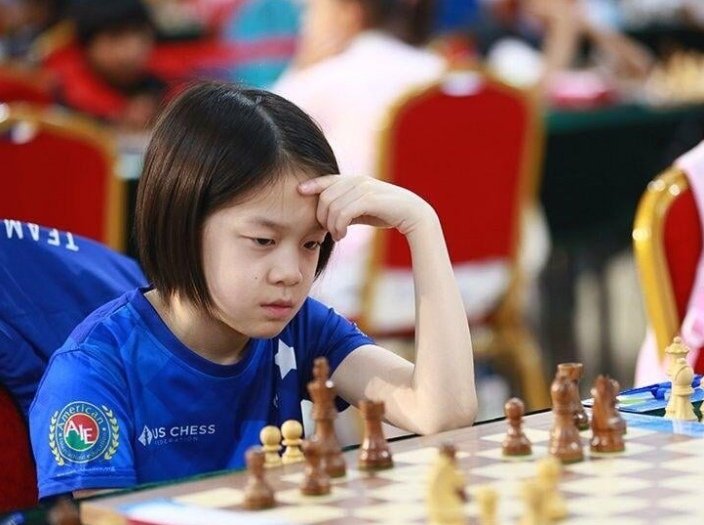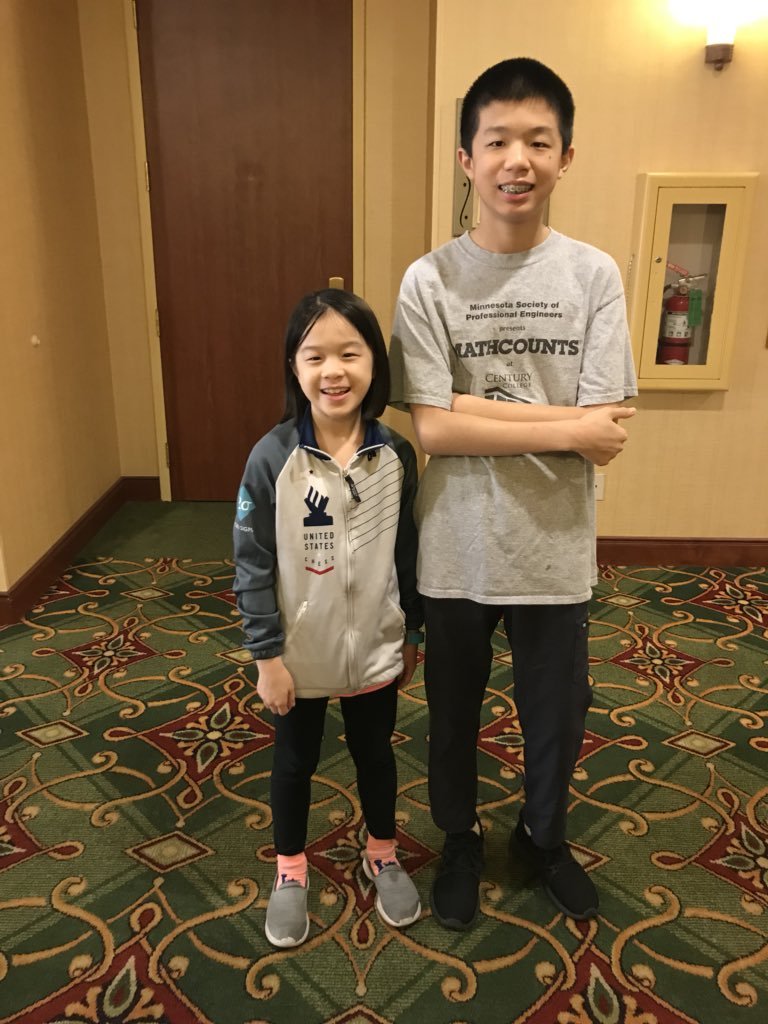Her News Interviews Alice Lee: 12-Year Old Woman International Master
“… look at where you played well in the game, rather than being completely fixated on where you didn’t play as well.”
BY IVANA CHAN - SUCCESS ACADEMY - HL MEMBER & HN COLUMNIST
FIDE
Woman International Master Alice Lee is a very accomplished 12-year-old. With a FIDE rating of 2237, Alice is a two-time gold medalist at the World Cadet Chess Championship, a two-time winner of the National Girls Championship, and a champion of the Online Cadets & Youth Rapid World Cup. She learned chess at the age of six from her father and she improved at a very fast pace as a result of her passion and the time she dedicated to chess. Alice became a National Master at age 10, and a Woman International Master at the age of 12. She was the youngest player in the U.S. Junior Championship and the US Girls' Junior Championship in 2020. Alice co-hosts the show "Alice's Pawn Palace" alongside FM Mike Klein on ChessKid.com. If you are interested in learning more about this inspiring chess player, we invite you to read this interview conducted by Her News writer Ivana Chan.
What was your motivation/inspiration to become such a strong player?
My dad first taught me chess when I was 6. My main goal after that was to beat him. This took about a year, but after I was finally able to beat him, my goal was to beat my brother, who was considerably better. He’s around my level right now, so I still can’t consistently beat him, but that was my motivation/goal from a very young age.
Another inspiration is that I looked up to strong female chess players like the Polgar sisters, Hou Yifan, Irina Krush, and Carissa Yip. They are inspirational to me. I want to approach their level, and that’s also what motivated me to work very hard to improve my chess.
Are you interested in other hobbies other than chess?
Yes, one thing that I recently got interested in is math, particularly contest math this year when my brother, who is amazing at math, encouraged me to try some competitions. The competition questions deal with middle to high school level math, but they are tricky to solve. I found thinking about these problems, trying to find strategies to solve them, to be like calculating different ideas in chess games. So this year, I participated in a math contest for high schoolers - the AMCs (American Mathematical Competition). I took the AMC10, this being my first time taking the test. I did pretty well, and qualified for the next invitational event called AIME (American Invitational Mathematics Exam). I will be taking it in a few days and am excited about it. Chess and math are two activities that occupy much of my time, but I enjoy many other things, like reading fiction books, history, and current events. I also run a mile every day as a habit. I find all of these activities pretty interesting.
What advice would you give to someone who wants to become a successful chess player?
One advice that I’d give, both to myself and to other chess players, is to not get discouraged by losses. One way I’d recommend is to look at where you played well in the game, rather than being completely fixated on where you didn’t play as well, although it is still important to see where you can improve. For me, the losses are the ones that taught me a lot of how I can play better. It also taught me how to persist through these defeats, and persistence is very important in becoming a successful chess player.
How do you recover after a loss in a tournament?
What I do is after each loss, I’d analyze the game and see how I lost, what phase of the game I didn’t do well in, and I’d correct it, so I most likely wouldn’t make the same mistake in the next game. I then take a mental break, like eating lunch or taking a walk outside, and try not to think of the last game result so I could go into the next game mentally ready. I’ve won a lot of tournaments where I lost a game early on, like in the North American Youth in Chicago where I got my WIM title. One thing that’s fantastic about chess is that every game is a fresh start, so you have a chance to have a better result in the next game, and treating the next few games like they are part of a new separate tournament is what I try to do.
How do you manage your emotions when you play against other strong/well known players in a high stakes tournament?
I find playing these strong players in high stakes tournaments very important for improvement and general experience because these players treat the game seriously. They give me a challenge to overcome. During the game, I try not to think about who I’m playing and just try to play my best moves. I’m thankful to get a chance to play against strong players because the games are interesting and instructive, no win being easy, no draw without a fight, and no losses without a lesson.
Can you describe your favorite or most memorable experience in your chess career?
There are a lot of those. I liked my first gold medal win in the World Cadet Chess Championship in Girls Under 10. It was my first OTB win for a big tournament on an international level. I also liked my win in the KCF National All Girls tournament when I was 9, because I won the G18 section after an upset loss in Round 2, which nearly knocked me out of the contention. But I was able to win the rest of the games, with a score of 5 out of 6, I won the tournament at the age of 9, which was one of the first big wins on the national level. My favorite tournament that I played in was the US Junior Girls Closed Championship. I participated in two of them, once online in 2020 when I was 10, and most recently in 2021 in person when I was 11, which was held in St. Louis. I got to go in person after about a whole year of only doing online tournaments. There I met some of the strongest girls, like Annie Wang who I was able to draw. It was great to meet and play against these girls, many of whom I looked up to for years. I also liked the St. Louis Chess Club who organized the tournament and sponsored the trip, covering lodging and travel costs. Overall, it was a stellar experience.
Was there one particular moment or event that inspired you to become such a strong player?
Well, there were many moments, but there was one that left a strong impression on me. It happened early when I was 7 years old. I didn’t have a formal coach at the time, but I went to a summer chess camp held at St. Olaf College, which was about 1 hour away from where I lived. That camp was taught by many chess grandmasters. One of them, GM Dmitry Gurevich, later became my coach. One evening, I went to a lecture given by GM Gregory Kaidanov, one of the best chess players in the world and a renowned chess coach. In that lecture, he gave several puzzles to about 100 students. For one puzzle, I raised my hand to give an answer, I was able to give an answer that involved a long sequence of moves on both sides, eventually resulting in a tactical advantage for one side. When I gave that answer, he was blown away, and he asked me a bunch of questions about myself and said that I had a lot of potential to be good. I found it inspiring: Solely based on that one answer I gave to his puzzle, he encouraged me to become a strong player, to reach a higher goal later. I found that memorable.
How much time do you dedicate to working on your chess skills?
This varies a lot. It depends on what other things I have to do that day. I have many other interests, as I mentioned, I do contest math, I run a mile every day, and I do a lot of readings as well. Some days I have more hours, other days I have fewer. I try to give a minimum of at least an hour if I can. I’d say 2 hours is pretty common. Some days I play chess, it could be all day, 12 hours or more. In chess, as well as in many other activities, it’s not just talent. Time spent on the activity is important, so I try to do what I can to put in the time.
What are your goals/plans to achieve next in chess?
I’m hoping to get another FIDE title, maybe IM or GM eventually. Outside of rating goals, I believe encouraging people to play chess is important. Chess is a great game because at the chessboard, it doesn’t matter our race, gender, income, or background. What matters is our chess skill and enjoyment for the game. I have met extraordinary people and traveled to many places that I wouldn’t have if not for chess. What I would like to do, in addition to improving my own chess skills, is to use chess as a tool to help people, inspire more people to play chess and build friendships through it. I’d like to be an inspiration for other people to play the game, like what the Polgar sisters, Hou Yifan, Irina Krush, and Carissa Yip were for me.
US Chess

